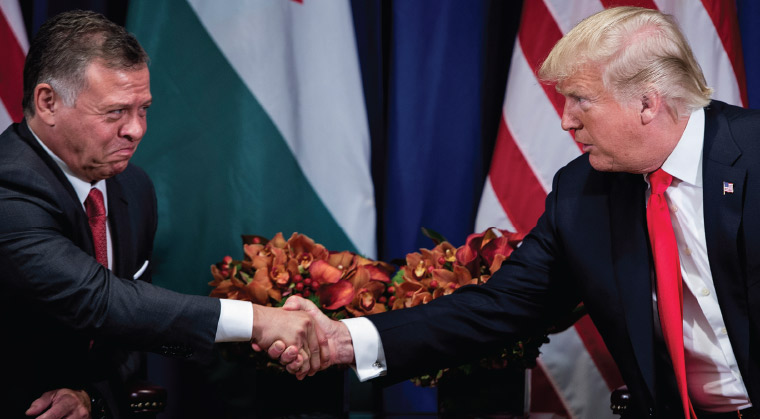The Middle East According to Trump


ATwitter storm ensued following President Trump’s campaign speech in West Virginia last week. Speaking on Israel and the American peace proposal, Trump said it was the Palestinians’ turn to get “something very good,” after the Israelis got the US embassy moved to Jerusalem.
Just a few days earlier, Israel’s Channel 10 reported that in response to a statement by Jordan’s King Abdullah that the Palestinians were willing to seek a one-state solution, Trump allegedly remarked that if there’s no peace deal and only one state exists, “in the future, Israel will have a prime minister called Muhammad,” and thereby elicited an uproar.
Is there something we don’t know? Did Trump turn on Israel?
Some big policy decisions undertaken by his administration would seem to suggest otherwise. On two major fronts — US funding for the Palestinian Authority, and official US recognition of Palestinian refugees — Trump seemed to signal a direction very different from what his reported words indicated.
The State Department announced last Friday afternoon that “at the direction of the President, we will redirect more than $200 million in FY2017 Economic Support Funds originally planned for programs in the West Bank and Gaza. Those funds will now address high-priority projects elsewhere.”
Following that announcement, a State Department official told Mishpacha: “This decision is separate from but consistent with Congress’s purpose in passing the Taylor Force Act, which restricts assistance to the Palestinian Authority unless it ends the abhorrent practice of payments to imprisoned terrorists and the families of terrorists.
“We acknowledge the challenges the international community faces in providing humanitarian and economic assistance in Gaza, where Hamas control endangers the lives of Gaza’s citizens and degrades an already dire humanitarian and economic situation. Hamas is fighting a morally bankrupt war at the expense of the Palestinian people. Hamas’s corrupt and illegitimate control has provoked conflict and led to poverty and hopelessness, while hampering the ability of the international community to help.”
Then came a report on Israel’s Channel 2 that come September, the administration will announce a new policy vis-a-vis UNRWA, the UN relief agency for Palestinian refugees, and that the US will recognize no more than half a million Palestinian refugees. Estimates of the number of Arab refugees from 1948 range between 500,000 and 850,000; although 50,000 are said to still survive, UNRWA factors in all their patrilineal descendants to arrive at a current figure of nearly 5 million. It’s no secret that Jared Kushner and White House staffers are not enamored with UNRWA. Several reports indicate that the administration considers the intergenerational refugee status as perpetuating and exacerbating the Israeli-Palestinian conflict.
It’s harder to understand how the president’s desire to “give something very good” to the Palestinians jibes with these policy moves. One possibility is that the president is differentiating between the abstract theoretical aspect (“They’ll yet be very happy”) and the practical moves he wants to make on the ground, here and now.
Whatever the case, Jerusalem doesn’t seem too worried. Last Friday, Netanyahu said he didn’t see any rush to present the American peace proposal. And when a close friend of the US president says such a thing, it’s reasonable to assume that he’s speaking from knowledge, not his own aspiration.
(Originally featured in Mishpacha, Issue 725)
Oops! We could not locate your form.













